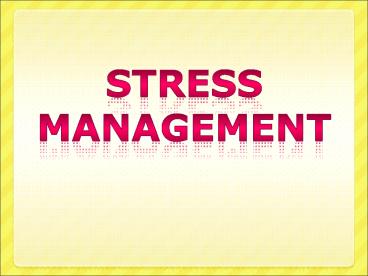Stress and your Health - PowerPoint PPT Presentation
1 / 23
Title:
Stress and your Health
Description:
Title: Stress and your Health Author: nhoneycu Last modified by: Owner Created Date: 9/15/2006 4:50:39 PM Document presentation format: On-screen Show (4:3) – PowerPoint PPT presentation
Number of Views:181
Avg rating:3.0/5.0
Title: Stress and your Health
1
Stress Management
2
What is stress?
The body's reaction to a change that requires a
physical, mental or emotional adjustment.
What is a stressor?
Anything that causes stress.
3
Stress can affect all areas of our lives, but is
all stress is bad? What makes a stress
positive or negative?
4
How you respond to a stressor or how you let it
affect you can make it positive or negative.
What might be a positive stressor for one person
could be a negative stressor for another.
5
Positive Stress Eustress If it helps you
achieve something, it is a positive stressor.
Negative Stress Distress If it keeps you from
regular daily activity, it is a negative stressor.
6
Do we have control Over what causes Us stress?
Not always, but we do have control over how we
let it affect us.
7
What is Environmental stress?
NATURAL DISASTERS
Pressure on the environment caused by human
activities or by natural events.
POLLUTION
8
What is a Biological stressor?
Conditions that make it difficult for your body
to take part in daily activity (illness, a
disability, injury).
9
What is a thinking stressor?
Anything that challenges us mentally (taking a
test, homework).
10
What are Behavioral stressors?
Unhealthy behaviors such as not getting enough
sleep or exercise, using tobacco, alcohol, or
drugs, poor eating habits.
11
What are life-Change stressors?
Any major life change, positive or negative
(death of a loved one, getting married,
graduating).
12
Describe the bodys fight-or-flight response to
stress
CLICK HERE
During fight or flight your body produces
adrenaline which provides you with energy,
reflexes and strength you may need to respond to
a stressor.
13
When stress occurs, your body goes through 3
stages
alarm body becomes aware of a
stressor resistance body works against the
stressor exhaustion body cannot take the
resistance or fight it anymore. You may become
sick.
14
Coping Skills
Define coping-
How you deal with stress.
Everyone deals with stress differently, some in a
positive way and some in a negative way. What
are some examples of both?
15
- POSITIVE
- Negative
- Exercise
- Listen to music
- Draw
- Meditate
- Go to a movie
- Hang out with friends
- Smoking
- Drugs
- Overeating
- Oversleeping
- Isolation
- Suppressing emotions
- Self-harm
Coping Skills
Can you think of any other ways?
16
How can long-term stress make you physically
sick?
Long-term stress can weaken your immune system,
making you more open to illnesses.
17
What is resiliency?
The ability to overcome challenges of all
kindstrauma, tragedy, personal crises, everyday
life problemsand bounce back stronger, wiser,
and more personally powerful.
18
The healthier you are physically when major
stressors occur, the more resiliency you have to
overcome that stressor.
19
What is Sleep deprivation?
Lack of sleep over an extended period of time.
What is insomnia?
Inability to sleep, even when tired.
What problems could occur from being sleep
deprived?
20
INCREASED RISK FOR GETTING HURT Sleepiness can
cause a lack of concentration and slow reaction
time, which can lead to dangerous and even fatal
accidents.
INCREASED RISK FOR GETTING SICK Long-term sleep
deprivation can decrease the bodys ability to
fight infection.
STRESS-RELATED PROBLEMS Even occasional sleep
deprivation can make everyday life seem even more
stressful and cause you to be less productive.
.
21
How much sleep do teens need each night?
Teens need about 9 hours a night.
What regulates how much sleep we need?
Circadian rhythm regulates your sleeping and
waking patterns. During puberty the rhythm is
delayed so teens want to go to bed later and
wake up later.
22
What are the 2 stages of sleep?
The 1st stage of sleep is called NREM in which
the body recovers from the stress of the days
activities. NON-RAPID EYE MOVEMENT
The 2nd stage of sleep is called REM in which
dreams occur. RAPID EYE MOVEMENT
23
Time, or lack of it, is a major stressor for
most people
...what are some things you can do to help
manage your time better?































